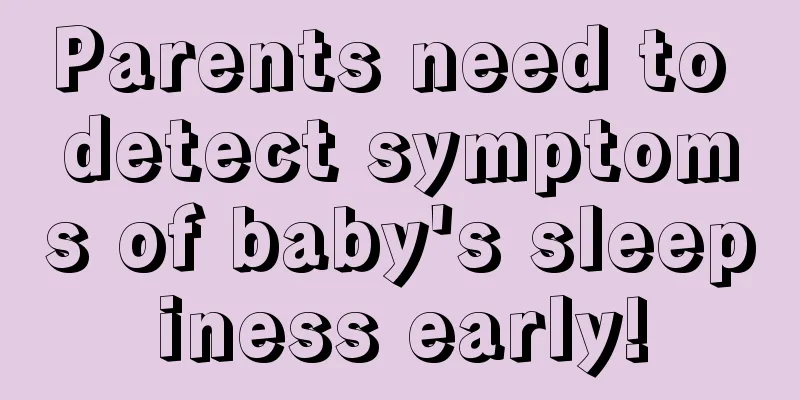Parents need to detect symptoms of baby's sleepiness early!

|
Experts say that there are certain standards for the baby's sleep time. If it exceeds this range, the baby may suffer from a certain disease. If the baby is sleepy under non-specific circumstances, he or she is very likely to suffer from narcolepsy, which will affect the baby's digestive function, reduce immunity, and make the baby more susceptible to respiratory diseases. 1. Symptoms of baby's sleepiness Generally, a one-month-old newborn baby sleeps 20-22 hours a day; a two-month-old baby sleeps about 18 hours a day; a three-month-old baby usually sleeps about 16 hours; after six months old, babies usually sleep 12-14 hours; and the sleep time will gradually decrease after that. If a baby's sleep time exceeds the above standards, he or she is more likely to suffer from drowsiness. In addition to sleeping too long, there are other symptoms of sleepiness in babies: Of course, if a baby has symptoms of drowsiness, it does not necessarily mean that he is suffering from drowsiness. It may also be caused by other diseases. For example, babies with visual problems may have sleep problems. Many babies with colds and fevers will also experience drowsiness. In addition, it is not surprising that they experience drowsiness when taking cold and allergy medicines (which have side effects). Babies may also have symptoms of drowsiness because they have serious diseases, such as viral encephalitis or Japanese encephalitis. 2. Harm of baby's sleepiness 1. Affect digestive function If a young child sleeps too much and does not eat or drink for a long time, it can easily cause excessive contraction of the stomach and intestines, hunger-related peristalsis of the stomach and intestines, disrupting the secretion of gastric juice and affecting digestive function. 2. Reduced immune function If young children sleep too long, it will reverse their normal biological clock and cause biological clock confusion. The human physiological structure determines that one should go to bed early and get up early. Therefore, sleeping too much every day for a long time will disrupt the physiological functions, causing the child's body resistance to weaken and immunity to decrease. 3. Susceptible to respiratory diseases Keeping the doors and windows of the bedroom closed for a long time will cause the air to become polluted. Even if the windows are half-open, some air will not circulate. The unclean air contains a large amount of bacteria, viruses, carbon dioxide and dust, which will affect the respiratory disease resistance of young children. Young children who are chronically sleepy usually exercise less, and coupled with the polluted air in the bedroom, they are prone to catching colds frequently, with symptoms such as headaches, fever, coughs and runny noses. |
<<: How to deal with a child with sore throat and fever?
>>: What are the treatments for brain cysts? Will it affect children's intelligence?
Recommend
What to do if your newborn moves his hands and feet while sleeping
When a baby is just born, his body is easily affe...
What season is best for calcium supplementation for babies? What season is best for calcium supplementation for children?
For many babies, as their bodies grow rapidly, th...
Baby slide
All babies love to play on slides. Whether in kin...
Symptoms of psychological disorders in children
Many parents now hold the mentality that as long ...
Treatment of baby's red bottom
We have seen many babies with red buttocks. Most ...
Why does my child's nose always bleed?
Children's health is a matter of great concer...
Reasons why babies sweat a lot
Many parents find that their children sweat a lot...
Why do babies have repeated fevers and what should parents do?
After all, babies are very young, so their physic...
What should I do if my child can't roll over at five months old?
We all know that many children can roll over by t...
What to do if the newborn still wants to eat after spitting up milk
After a newborn is born, the child's intestin...
How to train an autistic child
Many parents will become very distressed if their...
Symptoms of left brain hypoplasia in babies
What parents worry about most in their lives is t...
What should I do if my child’s blood routine is normal but has a high fever?
Children are the group most likely to develop hig...
The baby is more than three months old and keeps moaning
Parents love their children very much, especially...
What should I do if my child has a painful tongue ulcer?
Tongue ulcers are a very common phenomenon. This ...









